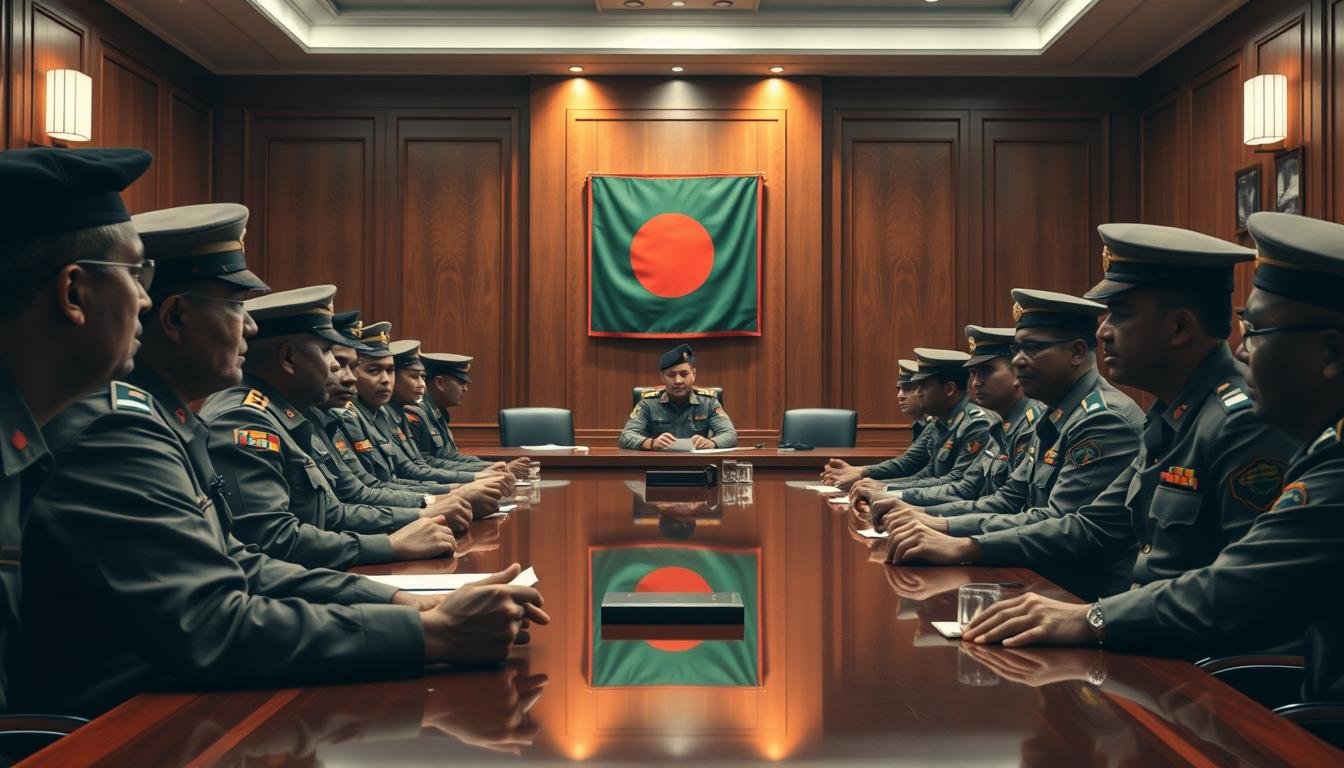The recent emergency meeting of the Bangladesh Army has sent shockwaves through the nation’s political landscape, raising concerns about the potential for increased political tension.
This significant event has sparked a mix of reactions from various political factions, with some calling for calm and others expressing concern over the implications.
The situation remains fluid, with many awaiting the outcomes and potential repercussions of this Bangladesh Army gathering.
Key Takeaways
- The Bangladesh Army’s emergency meeting has heightened political tension.
- Various political factions have reacted differently to the news.
- The situation is being closely monitored for potential outcomes.
- Concerns over stability and security have been raised.
- The international community is watching the developments closely.
The Political Landscape in Bangladesh
Understanding Bangladesh’s political landscape necessitates an examination of the historical context and current dynamics between civilian and military spheres. The country’s political environment is shaped by a complex history of interactions between its civilian government and the military.
Historical Context of Civil-Military Relations
Bangladesh’s history is marked by significant civil-military interactions, starting from its independence in 1971. The military has played a crucial role in the country’s politics, with several coups and periods of military rule. Civil-military relations have been a defining feature of Bangladesh’s political landscape.
| Year | Event | Impact on Civil-Military Relations |
|---|---|---|
| 1971 | Independence | Establishment of a new political order |
| 1975 | Military Coup | Shift towards military rule |
| 1991 | Return to Democracy | Civilian rule resumes |
Current Political Climate and Power Dynamics
The current political climate in Bangladesh is characterized by a dominant ruling party and a fragmented opposition. The military, while still influential, operates under a degree of civilian oversight. Power dynamics are complex, with the ruling party exerting significant control over the political process.
The interplay between these factors contributes to the overall political stability of Bangladesh, influencing both domestic policies and international relations.
Emergency Meeting in Bangladesh Army Made Political Tension
The recent emergency meeting held by the Bangladesh Army has raised concerns about the country’s political stability. This development has significant implications for the nation’s political landscape, given the historical context of civil-military relations in Bangladesh.
Timeline of Events Leading to the Meeting
The events leading to the emergency meeting have been unfolding over several weeks. Key indicators of rising tension included increased military presence in key locations and heightened rhetoric from military officials. The situation escalated when rumors of potential political instability began circulating on social media, prompting the army to take swift action.
A detailed timeline reveals that the first signs of trouble emerged when a prominent political figure made a statement that was perceived as a challenge to the military’s influence. This was followed by a series of strategic deployments of military personnel to key infrastructure points.
Key Participants and Their Roles
The emergency meeting involved top military officials, including the Chief of Army Staff and other high-ranking officers. These individuals play crucial roles in shaping the military’s response to the political situation. Their decisions are likely to have a significant impact on the country’s future.
The meeting also included representatives from various military branches, ensuring a comprehensive approach to addressing the perceived threats to stability. Coordination among these different branches is essential for effective decision-making.
Immediate Aftermath and Initial Reactions
In the immediate aftermath of the meeting, there was a noticeable increase in military presence on the streets. This move was accompanied by statements from military officials assuring the public of their commitment to maintaining order.
Initial reactions from the political community were mixed, with some parties expressing concern over the military’s actions, while others saw it as a necessary measure to ensure stability. The public’s response has been varied, with some calling for calm and others expressing fear about the potential consequences.
Inside the Emergency Meeting
The Bangladesh Army’s emergency meeting has sparked intense speculation about the discussions and decisions made within the military’s highest echelons. This meeting, convened at a time of heightened political tension, has raised numerous questions about the role of the military in the country’s governance and stability.
Disclosed Agenda Items
The official agenda of the meeting included discussions on security concerns and operational readiness. These topics are standard for military meetings, but the context of the current political climate has added a layer of complexity to these discussions. The military leadership emphasized the need for heightened vigilance and preparedness in the face of potential civil unrest.
Additionally, the meeting addressed the issue of internal security, focusing on measures to maintain order and stability within the country. This includes strategies to counter potential threats from extremist groups and to ensure the safety of citizens.
Undisclosed Discussions and Speculations
While the official agenda items have been disclosed, there is speculation about other topics that might have been discussed during the meeting. Observers believe that the military leadership may have deliberated on the political implications of their actions and the potential for future interventions.
Some speculate that the meeting might have touched upon the military’s stance in the event of escalating political tensions or protests. The possibility of the military being called upon to maintain order has raised concerns among various political factions.
Decision-Making Process Within the Military
The decision-making process within the Bangladesh Army is typically hierarchical, with senior officers holding significant sway. During the emergency meeting, it is likely that the Chief of Army Staff played a pivotal role in guiding the discussions and shaping the outcomes.
The meeting’s decisions are expected to reflect a consensus among the senior leadership, taking into account both the military’s institutional interests and the broader national context.
Government’s Response to the Army Meeting
The government’s reaction to the Bangladesh Army’s emergency meeting has been characterized by a mix of reassurance and caution. This response has been multifaceted, involving various branches of the government.
Official Statements from the Prime Minister’s Office
The Prime Minister’s Office has released official statements assuring the public that the government is in control and that the situation is under control. These statements have emphasized the government’s commitment to maintaining law and order.
The statements have also highlighted the government’s efforts to address the concerns raised by the army meeting, though specific details have been scarce. The Prime Minister’s Office has maintained that the government’s priority is to ensure stability and continuity.
Cabinet Ministers’ Reactions
Cabinet ministers have reacted to the army meeting with a mix of support for the government’s stance and caution regarding the implications of the meeting. Some ministers have publicly stated that the government’s response is aimed at maintaining stability.
| Minister | Statement | Implication |
|---|---|---|
| Minister of Information | Assured that the government is committed to maintaining law and order. | Reassures the public of government control. |
| Minister of Home Affairs | Emphasized the need for vigilance and cooperation with law enforcement agencies. | Highlights the importance of public cooperation. |
Government’s Strategic Positioning
The government’s strategic positioning in response to the army meeting involves a combination of diplomatic efforts, internal security measures, and public outreach programs. The aim is to stabilize the situation and prevent any potential escalation.
By emphasizing its commitment to stability and law and order, the government seeks to reassure both the public and international observers of its capability to manage the situation effectively.
Opposition Parties’ Reactions and Mobilization
As news of the Bangladesh Army’s emergency meeting spread, opposition parties quickly condemned the move, citing concerns over democratic processes. The opposition’s reaction has been swift and decisive, with leaders calling for calm among their supporters while simultaneously ramping up their criticism of the government’s perceived involvement in the military’s actions.
Major Opposition Coalitions’ Statements
The major opposition coalitions in Bangladesh have issued strongly worded statements against the army’s emergency meeting. For instance, the Bangladesh Nationalist Party (BNP) has called it a “blatant attempt to undermine democracy”. Similarly, other opposition parties have expressed their solidarity with the BNP’s stance, creating a united front against the government’s perceived backing of the military’s move.
“The army’s actions are a clear threat to our democratic institutions and the will of the people,” said a spokesperson for the opposition coalition.
Political Rallies and Demonstrations
In response to the army’s meeting, opposition parties have organized several political rallies and demonstrations across the country. These events have drawn significant crowds, with protesters voicing their discontent against the government’s policies and the military’s sudden gathering. The rallies have been largely peaceful, though there have been reports of clashes between protesters and law enforcement in some areas.
The opposition’s mobilization efforts are expected to continue in the coming days, potentially escalating the political tension in Bangladesh. As the situation unfolds, the international community is watching closely, concerned about the implications for the country’s stability and democratic future.
Public Perception and Social Media Response
The recent emergency meeting of the Bangladesh Army has triggered a flurry of responses on social media, reflecting diverse public perceptions. As the news spread, various social media platforms became hubs for discussion, speculation, and debate.
Trending Hashtags and Online Discussions
On platforms like Twitter and Facebook, several hashtags related to the Bangladesh Army’s meeting began trending. Users expressed their opinions, concerns, and speculations using hashtags such as #BangladeshArmy and #PoliticalTension. Online discussions were characterized by a mix of political analysis, calls for calm, and expressions of concern over the potential implications of the meeting.

Public Opinion Polls and Street Interviews
Various media outlets and polling organizations conducted public opinion polls and street interviews to gauge the public’s response to the Bangladesh Army’s emergency meeting. The results showed a divided public opinion, with some expressing support for the military’s actions and others voicing concern over the potential for political instability. Street interviews revealed a range of reactions, from calls for the government to take decisive action to demands for transparency and calm.
Media Coverage and Analysis
The sudden convening of an emergency meeting by the Bangladesh Army has sparked a flurry of media reports and analyses. This event has garnered significant attention due to its potential implications for the country’s political landscape.
Domestic media outlets have been at the forefront of covering the story, providing detailed reports on the meeting’s agenda and the potential outcomes. Pro-government media has generally portrayed the event as a routine military exercise, downplaying any potential political significance. In contrast, independent and opposition-aligned media have been more speculative, often linking the meeting to the current political tensions in the country.
Domestic Media Perspectives
Domestic media coverage has varied significantly depending on the outlet’s political leanings. For instance, a leading Bangladeshi newspaper noted that the meeting was a response to internal security concerns, while another publication speculated about potential political repercussions.
“The Bangladesh Army’s emergency meeting is a clear indication of the complex political dynamics at play. It remains to be seen how this development will influence the country’s political future.” –
| Media Outlet | Political Leanings | Coverage Focus |
|---|---|---|
| Daily Star | Independent | Political Implications |
| Prothom Alo | Independent | Internal Security |
| Bangladesh Today | Pro-Government | Routine Military Exercise |
International Media Coverage
Internationally, the response has been equally varied, with major news agencies providing coverage based on their regional interests and geopolitical analyses. The international media coverage has often highlighted the potential regional implications of the Bangladesh Army’s actions, with some outlets speculating about the influence of global powers on the situation.
Overall, the media coverage of the Bangladesh Army’s emergency meeting reflects the complex and multifaceted nature of the event. As the situation continues to unfold, it is likely that media analysis will play a crucial role in shaping public perception and understanding of the developments.
Historical Precedents of Military Intervention in Bangladesh
Since its inception, Bangladesh has experienced a tumultuous relationship between its military and political institutions, with several military interventions altering the course of its history. Understanding these historical precedents is crucial for grasping the complexities of the current political tension.
Previous Military Coups and Their Outcomes
Bangladesh has witnessed several significant military coups since its independence in 1971. The first coup occurred in 1975, leading to the assassination of the country’s founding father, Sheikh Mujibur Rahman. This event marked the beginning of a period of military rule that lasted until 1990. The outcomes of these coups have varied, with some leading to short-term military rule and others resulting in the restoration of democratic governance.
For instance, the coup in 1975 not only changed the leadership but also shifted the country’s political ideology. Similarly, the 1982 coup led by General Hussain Muhammad Ershad exemplified how military intervention could lead to a prolonged period of authoritarian rule.
Comparison with Current Situation
The current emergency meeting of the Bangladesh Army has drawn parallels with past military interventions, raising concerns about the potential for a similar outcome. However, the current political landscape is distinct due to the presence of a robust democratic framework and active civil society.
While historical precedents suggest that military intervention can have significant political repercussions, the current situation is also influenced by global and regional factors, as well as the government’s response to the army’s meeting. The outcome remains uncertain, with various stakeholders closely watching the developments.
Economic Implications of the Political Tension
Political tension in Bangladesh, sparked by the army’s emergency meeting, is having far-reaching economic implications. The uncertainty surrounding the political situation is affecting various sectors of the economy.
Stock Market Reactions and Business Confidence
The stock market in Bangladesh has experienced significant fluctuations in response to the political developments. Investors are cautious, leading to a decrease in trading activities. Business confidence has also been affected, with many enterprises adopting a wait-and-see approach.
Foreign Investment Concerns
Foreign investors are closely monitoring the situation, with some expressing concerns about the stability of the investment climate. The political uncertainty could potentially deter new investments and affect the existing investment projects.
Impact on Bangladesh’s Economic Stability
The overall economic stability of Bangladesh is under scrutiny. The political tension is likely to impact the country’s GDP growth, inflation rate, and employment opportunities.
| Economic Indicator | Pre-Crisis | Current | Projected |
|---|---|---|---|
| GDP Growth Rate | 7% | 6.5% | 6% |
| Inflation Rate | 5.5% | 6% | 6.5% |
| Foreign Investment | $2 billion | $1.8 billion | $1.5 billion |

US-Bangladesh Relations Amid the Crisis
The unfolding crisis in Bangladesh has significant implications for its relations with the United States, a key ally in the region. The US has been a long-standing partner for Bangladesh in various sectors, including defense, trade, and development.
Historical US-Bangladesh Military Cooperation
The military cooperation between the US and Bangladesh has a rich history, with the US providing significant military aid and training to Bangladesh’s armed forces. This cooperation has been crucial in enhancing Bangladesh’s defense capabilities and promoting regional security. The US-Bangladesh military cooperation has been a cornerstone of their bilateral relations, with both countries benefiting from joint exercises, defense dialogues, and capacity-building programs.
Official US Response to the Situation
The official US response to the current crisis in Bangladesh has been cautious, with the US State Department calling for calm and restraint. The US is closely monitoring the situation, and there have been diplomatic communications between the two countries. The US administration is likely to balance its concerns about stability in Bangladesh with its commitment to democratic values and human rights.
Potential Impact on Bilateral Relations
The crisis in Bangladesh could have significant implications for its bilateral relations with the US. Depending on how the situation unfolds, the US may reassess its engagement with Bangladesh, potentially affecting areas such as trade, security cooperation, and development assistance. The future of US-Bangladesh relations will depend on the ability of both countries to navigate these challenges while maintaining their shared interests.
Expert Analysis and Predictions
In the wake of the Bangladesh Army’s emergency gathering, political scientists, military analysts, and diplomatic observers are offering their insights into the situation. Their analyses provide a nuanced understanding of the potential implications and future developments.
Perspectives from Political Scientists
Political scientists are analyzing the meeting within the context of Bangladesh’s political history and current governance structure. Dr. Ali Riaz, a political scientist, notes that the military’s intervention could signal a shift in the political dynamics, potentially affecting the balance of power.
The implications of this shift are multifaceted, with some experts warning of increased political instability.
Assessments from Military Analysts
Military analysts are evaluating the meeting’s significance in terms of the Army’s internal dynamics and its relationship with the government. According to military analyst Major (Retd) Syed Kamal, the meeting may indicate a consolidation of power within the military leadership.
This development could have significant implications for Bangladesh’s national security and defense policies.
Insights from Diplomatic Observers
Diplomatic observers are closely monitoring the situation, assessing its potential impact on Bangladesh’s international relations. A senior diplomat notes that the international community is likely to scrutinize the government’s response to the military’s actions.
The diplomatic community’s reaction will be crucial in shaping the global response to the unfolding situation.
Potential Scenarios and Outcomes
The emergency meeting of the Bangladesh Army is a critical juncture, potentially leading to several outcomes that could either stabilize or destabilize the political environment. The meeting has sparked intense speculation about the future of Bangladesh’s political landscape.
Peaceful Resolution Pathways
A peaceful resolution to the current political tension is contingent upon several factors, including dialogue between the government and opposition parties, and the military’s commitment to maintaining neutrality. Diplomatic efforts from international partners could also play a crucial role in facilitating a peaceful outcome.
Escalation Risks and Warning Signs
Conversely, there are risks of escalation if the situation is not managed carefully. Warning signs include increased militarization of public spaces, heightened rhetoric from political leaders, and signs of unrest among the populace. Early intervention through diplomatic channels and confidence-building measures between the government and opposition could mitigate these risks.
Long-term Political Implications
The long-term implications of the Bangladesh Army’s emergency meeting will depend on the outcome of the current situation. A peaceful resolution could lead to a more stable political environment, while an escalation could result in prolonged instability. The table below outlines potential scenarios and their implications:
| Scenario | Short-term Impact | Long-term Impact |
|---|---|---|
| Peaceful Resolution | Stabilization of political environment | Enhanced political stability and potential for economic growth |
| Escalation | Increased political tension and unrest | Prolonged instability and potential for economic downturn |
Conclusion: The Path Forward for Bangladesh
The Bangladesh Army’s emergency meeting has sparked significant political tension, raising concerns about the country’s stability. As the situation continues to unfold, it’s essential to consider the potential implications and the path forward for Bangladesh.
The meeting has highlighted the complex dynamics between the military, government, and opposition parties. To address the current tension, it’s crucial to establish a dialogue between these stakeholders and work towards a peaceful resolution.
The international community, including the US, is closely watching the situation, and their responses will likely have a significant impact on Bangladesh’s economic and political stability. As the country navigates this challenging period, finding a path forward that balances the interests of various stakeholders will be critical.
In conclusion, Bangladesh stands at a critical juncture, and the decisions made in the coming days will shape its future. A peaceful and inclusive approach to resolving the current political tension is essential for maintaining stability and promoting economic growth in Bangladesh.
FAQ
What sparked the Bangladesh Army’s emergency meeting?
The Bangladesh Army’s emergency meeting was sparked by rising political tension and concerns over national stability.
How has the government responded to the Bangladesh Army’s emergency meeting?
The government has issued official statements from the Prime Minister’s Office, with cabinet ministers also reacting to the situation, and is strategically positioning itself in light of the meeting.
What are the potential economic implications of the political tension?
The political tension resulting from the Bangladesh Army’s emergency meeting may impact stock market reactions, business confidence, and foreign investment, potentially affecting Bangladesh’s economic stability.
How have opposition parties reacted to the Bangladesh Army’s emergency meeting?
Opposition parties have issued statements, with major opposition coalitions reacting to the situation, and have organized political rallies and demonstrations.
What is the historical context of civil-military relations in Bangladesh?
Bangladesh has a complex history of civil-military relations, with previous military coups and interventions shaping the country’s political landscape.
How has the US responded to the crisis in Bangladesh?
The US has a history of military cooperation with Bangladesh, and its official response to the situation may impact bilateral relations between the two countries.
What are the potential scenarios and outcomes of the Bangladesh Army’s emergency meeting?
Potential scenarios include pathways to a peaceful resolution, risks of escalation, and long-term political implications, which will depend on various factors, including government and opposition responses.
How has social media responded to the Bangladesh Army’s emergency meeting?
Social media has seen trending hashtags and online discussions, with public opinion polls and street interviews providing insight into the general public’s reaction to the situation.
What are the key takeaways from expert analysis and predictions?
Experts, including political scientists, military analysts, and diplomatic observers, offer nuanced perspectives on the situation, providing insights into potential future developments.

